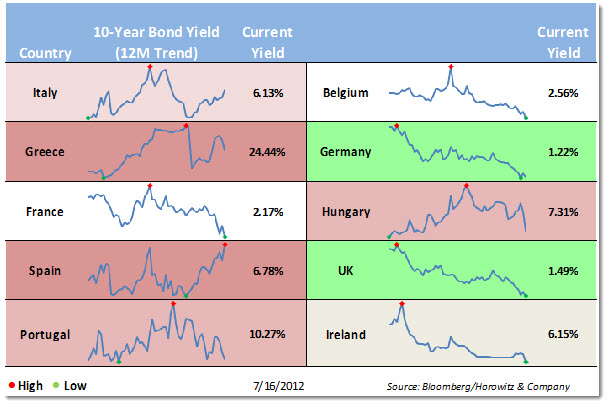In an effort to ensure that they get paid back money lent to EuroZone sovereigns, the ECB is looking to allow haircuts for private bondholders. As we saw with Greece, the ECB is all too willing to prop up the markets and then when the bonds begin to fail, they insulate themselves and push all of the risk on private bondholders.
If they think that this scheme is going to work, they are sorely mistaken. Already there is great trepidation in owning bonds of the peripheral countries as the lack of any support to trigger CDS hedges has left many with significant losses. Obviously, the ECB will do all that they can to word a default in a way so that banks and other financial institutions won’t have to pay up during a soft-default.
Yes, it is very unfair, but since they make the rules, it is hard to challenge anything they do, no matter how criminal it may seem.
July 16 (Bloomberg) — The European Central Bank would no longer oppose the imposition of losses on senior bondholders of euro-area banks, said two officials with knowledge of the ECB‘s thinking.
A key condition to imposing losses is if the bank in question is being wound down, one of the officials said. The ECB supported imposing losses on senior bondholders of ailing Spanish banks at a meeting of euro-area finance ministers in Brussels on July 9, though the proposal didn‘t get much traction, the other official said. Both of them spoke on condition of anonymity as the talks are confidential. The Wall Street Journal today reported the ECB‘s change of position, after the Frankfurt-based ECB consistently opposed handing losses to senior creditors of Irish banks following the collapse of the country‘s financial sector. An ECB spokesman declined to comment on the WSJ report. The ECB‘s position has evolved since it opposed forcing losses on the senior creditors of Irish banks including Anglo Irish Bank Corp. and Irish Nationwide Building Society after the government started to inject capital into the banks in 2009. Then, the ECB argued that reneging on the senior Irish bank debt
would damage financial stability in the wider euro area.The ECB also opposed efforts to restructure Greek sovereign debt and refused to take losses on Greek government bonds held on its balance sheet earlier this year. European officials are now debating how best to rescue Spain‘s banks after its leaders requested 100 billion euros ($122 billion) of international aid last month, becoming the fourth euro nation to seek help after Greece, Ireland and Portugal.

















